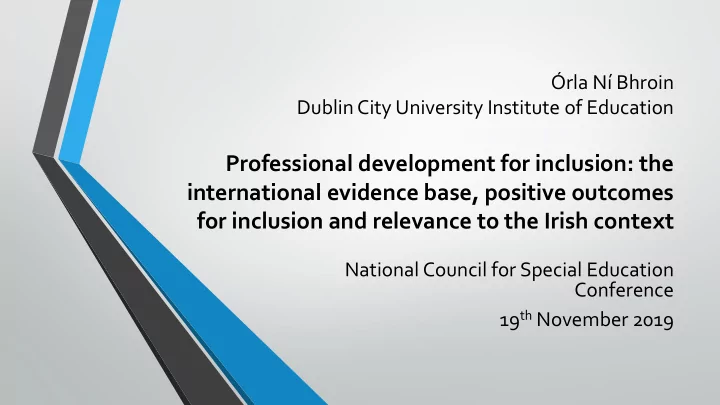

Órla Ní Bhroin Dublin City University Institute of Education Professional development for inclusion: the international evidence base, positive outcomes for inclusion and relevance to the Irish context National Council for Special Education Conference 19 th November 2019
Professional development defined “life -long teacher learning…full range of educational experiences designed to enrich teachers’ Effective professional professional knowledge, development … “structured understanding and capabilities professional learning that results throughout their careers” in changes to teacher knowledge (Teaching Council, 2011, 19). and practices, and improvements in student learning outcomes” (Darling-Hammond, Hyler & Gardner, 2017, 2).
Effective professional development generally • Intensive and ongoing • Focuses on content knowledge and student learning • Job embedded • Aligns with other learning activities and school improvement goals • Provides opportunities for active learning on part of teachers • Allows teacher agency in relation to experimentation • Involves collaborative inquiry (PLC; CoP) • Involves purposeful reflection on experience • Develops strong working relationships among teachers • Includes coaching and performance feedback
Evidence favouring a multi-layered system of professional development Conference Workshop Self In-service management Training PD Activities Coaching Online Mentoring Modules PLCs Explicit teaching+ intensive, ongoing supports = improved, higher quality teacher practices.
The necessary co-existence of special and inclusive education • An individualised response to difference, targeting differentiated supports to address individual difficulty for some • A rights-based approach to education aiming to ensure that “those in vulnerable situations, persons with disabilities, indigenous peoples, those in remote rural areas, ethnic minorities, the poor, women and girls, migrants, refugees, and displaced persons whether as a result of conflict or natural disaster” (UNESCO, 2018, p.2 ), are not excluded or marginalised from or within education systems (Florian, 2019, p.700)
Research evidence on professional development for inclusion • Teachers need to experience cognitive conflict in their thinking, to progress from established beliefs and knowledge in order to learn and to embrace new practices (Wheatley, 2002). • Research on PD for inclusion has focused on attitudes and beliefs, knowledge and practice, and the pedagogies that have been effective in influencing and enhancing these components.
PD: teacher beliefs and attitudes about inclusion • Teachers with positive attitudes about inclusion are more likely to adapt their teaching to accommodate diversity (Campbell et al., 2003; Forlin, 2009) • Teachers who engaged in PD for special needs education are more likely to display positive attitudes to inclusion (de Boer et al., 2011; Male 2011) • Discursive practice is an effective approach for challenging and transforming deterministic beliefs about difference (Florian, 2008; Peters & Reid, 2009) • Teacher self-efficacy is a strong predictor of teacher attitudes to inclusion (Sooda et al., 1998; Weisel & Dror, 2006) • After a one-week training course of forty hours duration, teachers displayed diminished concerns about teaching students with SEN in inclusive contexts and an improved sense of teaching efficacy for inclusive education (Forlin et al., 2014).
PD: teacher knowledge and practices for inclusion (Florian & Graham, 2014) Characteristic Explanation for Inclusive Pedagogy: Example Teachers Circumspection take critical stance on practices that Imaging possibilities for transforming (understanding) marginalise or limit learning environment Comportment embody inclusive disposition oriented Circulate, provide individual support (disposition) towards ‘everybody’ without stigmatising Essence (values) privilege notion of everybody, accept Draw on socio-cultural perspectives on responsibility for learning of all students learning Solicitude (care) ‘leap ahead’ to ensure all students have Expand range of choices, empower opportunities for meaningful and self- learners to direct their learning directed participation Conscience (self- challenge social norms of bell-curve Imagine and plan learning activities awareness) thinking that do not involve bell-curve thinking
PD: teacher knowledge and practices for inclusion – lesson study (Messiou et al. 2016) • Using lesson study, incorporating student voice, to develop new ways to meet needs of all learners (8 PP schools in England, Portugal and Spain). Teachers worked in trios to create inclusive lessons. Teachers sought students’ opinions about preferred learning activities for incorporating into planned lessons. • Findings: increased understanding of importance of providing imaginative and varied approaches for learners with positive impact on student learning. • Central: teacher collaboration and willingness to listen to views of colleagues and students.
Research evidence on professional development for inclusion of learners with special educational needs • PD included explicit teaching/tutoring in evidence-based • Oakes et al. (2018) practices paired with intensive and • Laughlin et al. (2018) ongoing supports, e.g., reflection, problem-solving, observation, • Muttiah et al. (2018) coaching/ mentoring from more • Bafle (2018) knowledgeable other with performance feedback, leading to enhanced, higher quality teacher practices.
Foregrounding collaborative expertise in professional development for inclusion • That necessary co-existence of special and inclusive education? • Collaboration between mainstream class teachers and special education teachers in ways that support the learning of everyone • Suggests a focus of PD for inclusion on teaching teachers to how to work “with and through other adults in ways that respect the dignity of learners as full members” of the classroom community (Florian 2014, 291)
Job-embedded professional development (Streiker et al., 2012) • 6 schools committed to including all students with SEND in general education core curriculum • JEPD based on collaborative structure of colleagues within schools, teachers worked collaboratively with an inclusion consultant (MKO) on action plans and were supported by the inclusion consultant at key stages during roll out of programme. • Findings: Increasing participation of students with SEND in core academic activities in inclusive classrooms
Professional learning community enhancing teacher expertise for inclusion (Brennan, 2017) • Case study: PD experience designed to incorporate core features • Onsite explicit teaching and coaching from more knowledgeable other • Focus on developing teacher capacity to design and offer range of choices to learners • Findings: improved learning outcomes for learners, enhanced teacher confidence in their expertise to include, enhanced collaboration and professional relationships within the school.
A Framework for Developing Collaboration for Inclusion of Students with Support Plans (Ní Bhroin & King, 2019) Collaboration Joint instructional work Communication Values and ethics
Thank you
Recommend
More recommend